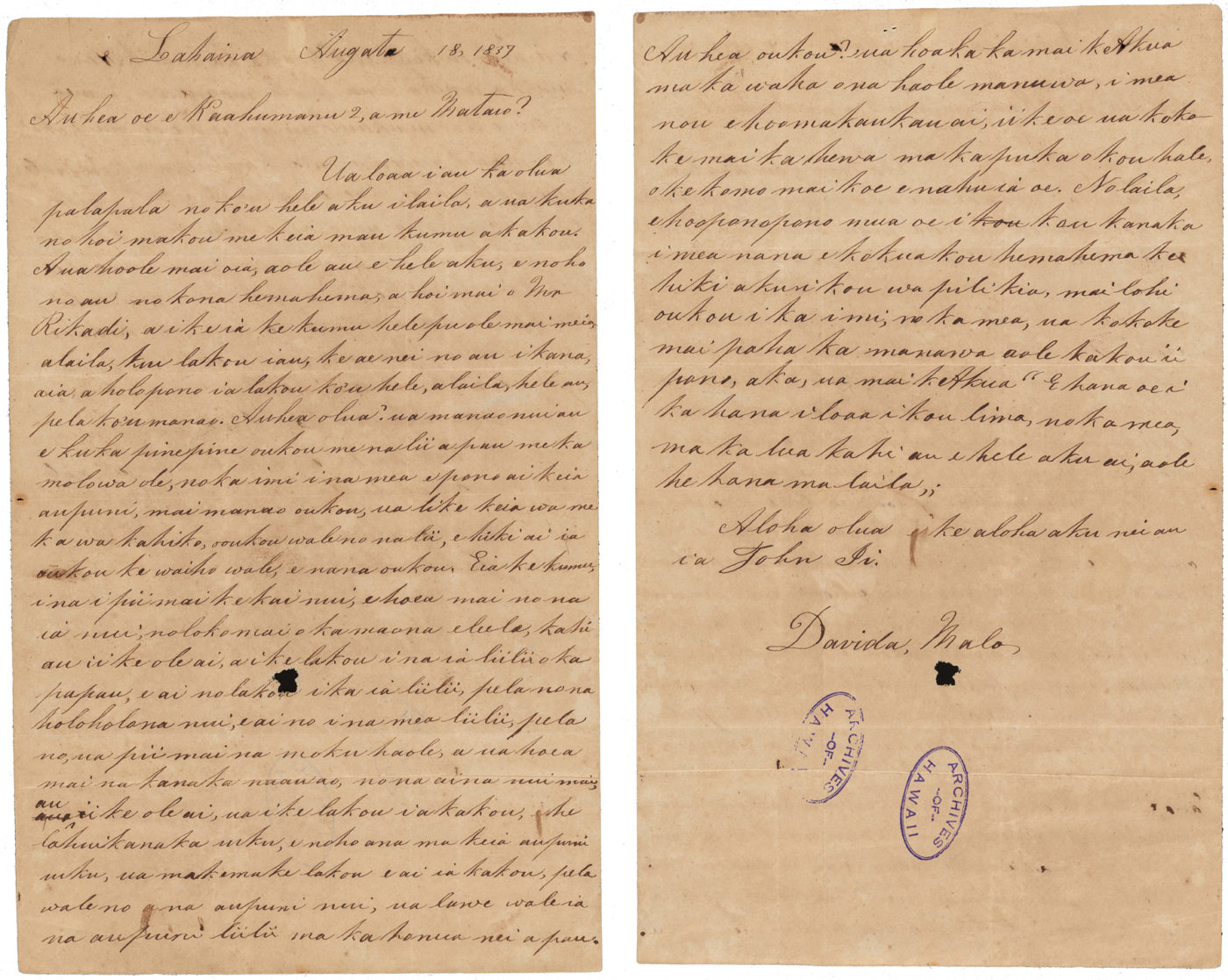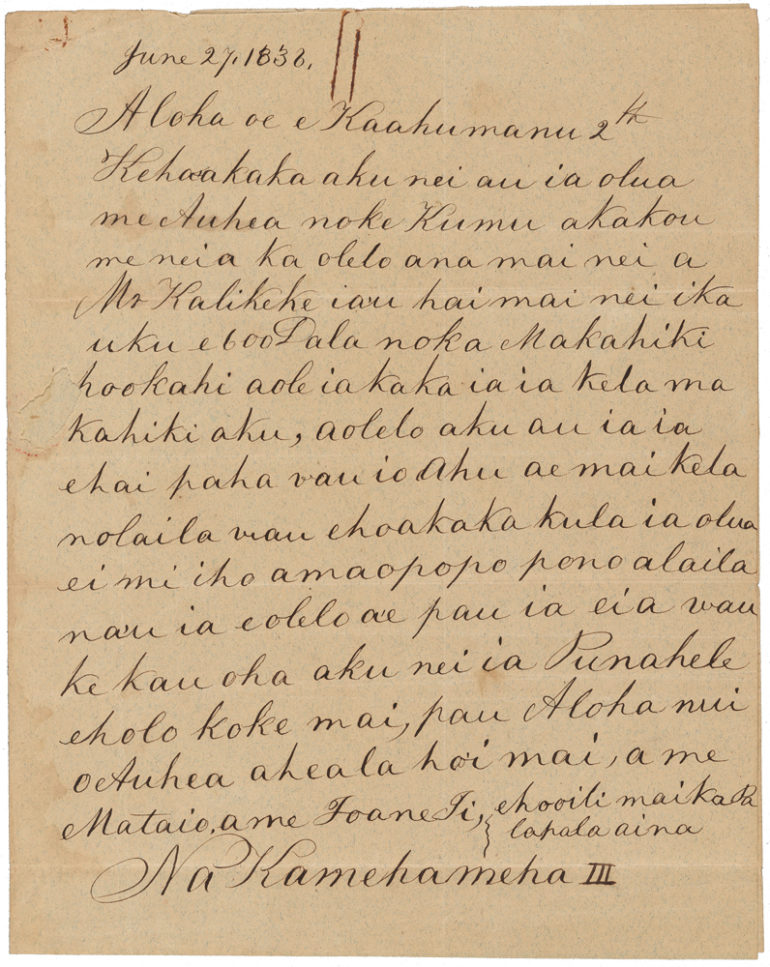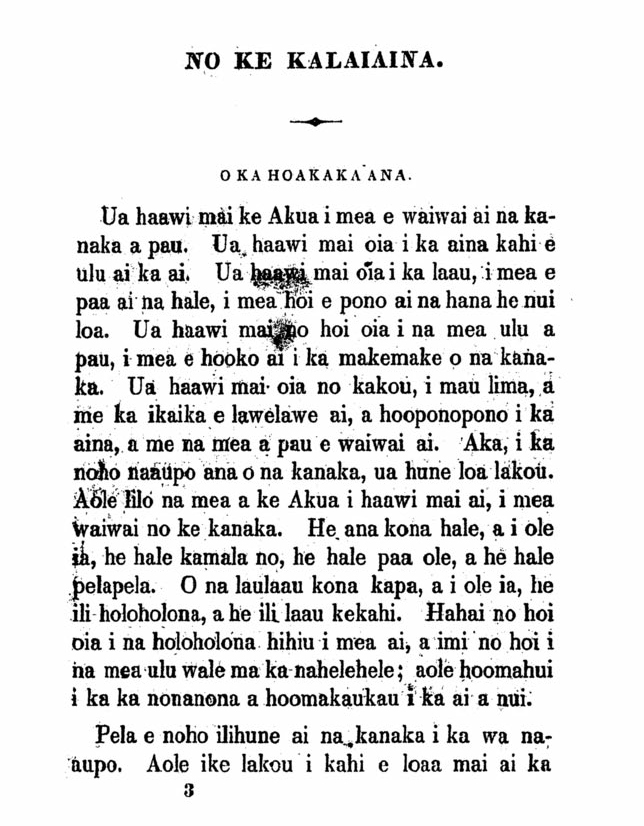By the mid-1830s, Hawai‘i had endured a series of escalating foreign conflicts. Kauikeaouli (Kamehameha III) was pressured from all sides to restructure Hawai‘i’s government or risk the loss of sovereignty. Visiting ships’ commanders, the American missionaries, foreign merchants and a cadre of influential Hawaiian advisers all urged the king to embrace a system of laws aligned with those of “civilized” nations.
Choosing Western Understanding
- According to anthropologist and legal scholar Sally Engle Merry, “in order to be ‘civilized’ in the global moral economy of the nineteenth century, a country had to present itself as a society governed by law.”3
- Kuhina nui Kīnaʻu (Ka‘ahumanu II) and her husband, Mataio Kekūanāoʻa, the governor of O‘ahu, asked David Malo for advice. He replied by letter:
“I have thought much that you two should frequently deliberate with all of the chiefs without laziness to seek for the things that will benefit this kingdom, do not think that this time is like the ancient times. …
This is the reason. If a big wave comes in, large fishes will come from the dark ocean from a place unseen, and when they see the small fishes of the shallows, they will devour them; such is also the case with large animals; they will prey on the smaller ones. Likewise, the ships of the white man have come, and knowledgeable people have arrived from powerful countries which you have never seen before. They know our people are few in number and living in a small country; they will eat us up. Such has always been the case with large countries; the small ones have been taken over throughout the world.”
—David Malo, in letter dated August 18, 1837 (translation by Noelani Arista)
- To gain a wider perspective, Kauikeaouli and his chiefs hired the Rev. William Richards to tutor them in Western laws, politics and economy. Richards, who spoke fluent Hawaiian, was a trusted adviser of the royal family and had instructed the young Kauikeaouli. Richards received $600 a year for his position and was required to resign from the Mission.
The No Ke Kālai‘āina Seminars
- Beginning in July 1838, in Lahaina, Richards began teaching daily seminars on political economy to the chiefs and their top advisers, including David Malo and John Papa Ī‘ī. As a text to teach economic principles, Richards translated the theories from Francis Wayland’s The Elements of Political Economy into Hawaiian, drawing on Hawaiian examples the chiefs would be familiar with to illustrate key points.
- The lectures were printed in a 248-page book titled No Ke Kalaiaina, referencing the land redistribution that traditionally took place after a ruling ali‘i’s death. “I prepare the work in the form of Lectures & spend two hours every day with the king & chiefs in reading these lectures and in conversation on practical subjects …” Richards wrote.5
- Richards, who supported the Hawaiian monarchy, also “believed in broad individual rights, liberty, protections against unfair taxation, and equality before the law for commoners and chiefs alike.”6 He urged the creation of an independent judiciary to hold ali‘i and commoners accountable to the same laws, and emphasized the importance of public schools. He also argued that “in the greatly enlightened lands,” people owned their own land, which enabled them to thrive. This last argument would pave the way for the Māhele of 1848.
The No Ke Kālai‘āina seminars were a pivotal point in Hawaiian history. They encouraged the ali‘i to debate the ideas that would shape Hawai‘i’s Declaration of Rights and Constitution, which became building blocks to a “civilized” and “enlightened” Hawai‘i.
3 Translation by Hawai‘i State Archives (partial): “My dear Kaahumanu, I wish to explain to you and Auhea about our teacher. Mr. Richards told me that the salary would be $600.00 a year, he does not know about the year after. I told him I must let Oahu know of it and he consented, so I am letting you know about this. You must therefore think over the proposition and I will inform him of your intentions.”
4 Merry, Sally Engle, Colonizing Hawai‘i: The Cultural Power of Law, Princeton University Press, Princeton, 2000, p. 36.
5 William Richards to Rufus Anderson, ABCFM, August 1, 1838, ABCFM Collection, Hawaiian Mission Houses Digital Archive, HMHA/HMCS (NKK, footnote 46)
6 Woods, Thomas, “No Ke Kalaiaina and William Richards’s Seminar for the Aliʻi: A Major Catalyst for Mid-Nineteenth-Century Change in Hawaiʻi,” p. 30, https://bit.ly/2SNSCJs.



